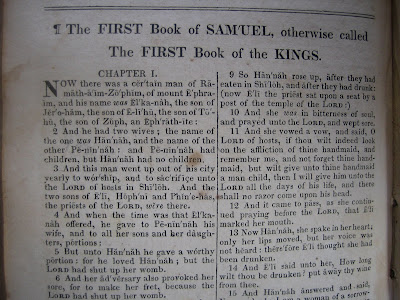 In response to "Hieronmio", here is a larger version of the image in the post on the "Pronouncing Bible", showing some of Alger's markings.
In response to "Hieronmio", here is a larger version of the image in the post on the "Pronouncing Bible", showing some of Alger's markings.As the subtitle of the book indicates, Alger was actually following the pronunciation guidelines of John Walker. Walker's work on proper "American" pronunciation began around 1790 and extended for the next forty years, during which time he authored numerous influential lexicographic works such as The Elements of Elocution, a rhyming dictionary, and his long-standing Critical Pronouncing Dictionary and Expositor of the English Language (cited by Alger). By the time the third edition of Noah Webster's ever-popular American Dictionary of the English Language appeared in 1830, Walker's "Key" to the pronunciation of "Greek, Latin, and Scripture Proper Names" (also cited by Alger) was popular enough to be prominently credited on the title page of the book.
Walker achieved his ascendancy through constant republication of his works and by allowing other reference book-writers to incorporate his material (striking an early blow for open source?); Esther Sheldon, writing in PMLA in 1947, counted at least a dozen dictionaries and language reference works of the first half of the nineteenth century that openly used Walker's keys.
Interestingly, while many other pronunciation experts at the time believed that their science was meant to be prescriptive rather than descriptive (that is, their job was to tell people how to properly pronounce words and not simply to record how people actually were pronouncing them), Walker pressed moderately in the opposite direction, believing that proper pronunciation is simply a function of social class combined with education. To that end, his records most often reveal how the more educated or upper class speakers of turn-of-the-century America pronounced their words. As Henry Wyld, author of History of Modern Colloquial English puts it: "He [Walker] appeals constantly to the habits of our most elegant speakers, that is, to a real type of existing English, and he must be held to mirror the usage of his day among refined and learned, and though to a less extent perhaps, among fashionable [speakers]." Wyld observes that Walker "does not set out to 'reform' English speech by destroying everything that is traditional and habitual."
Eli thought Hannah was drunk, but she was just askin' the Lord for a man child. Nice.
ReplyDelete